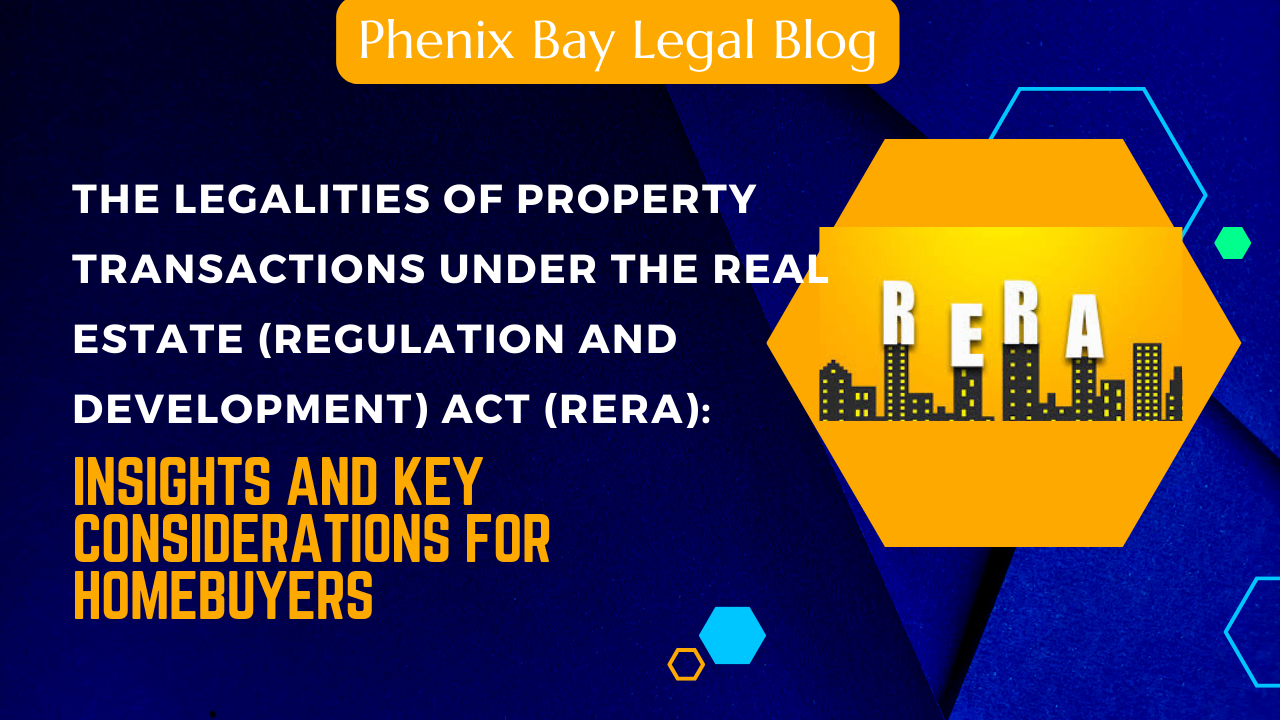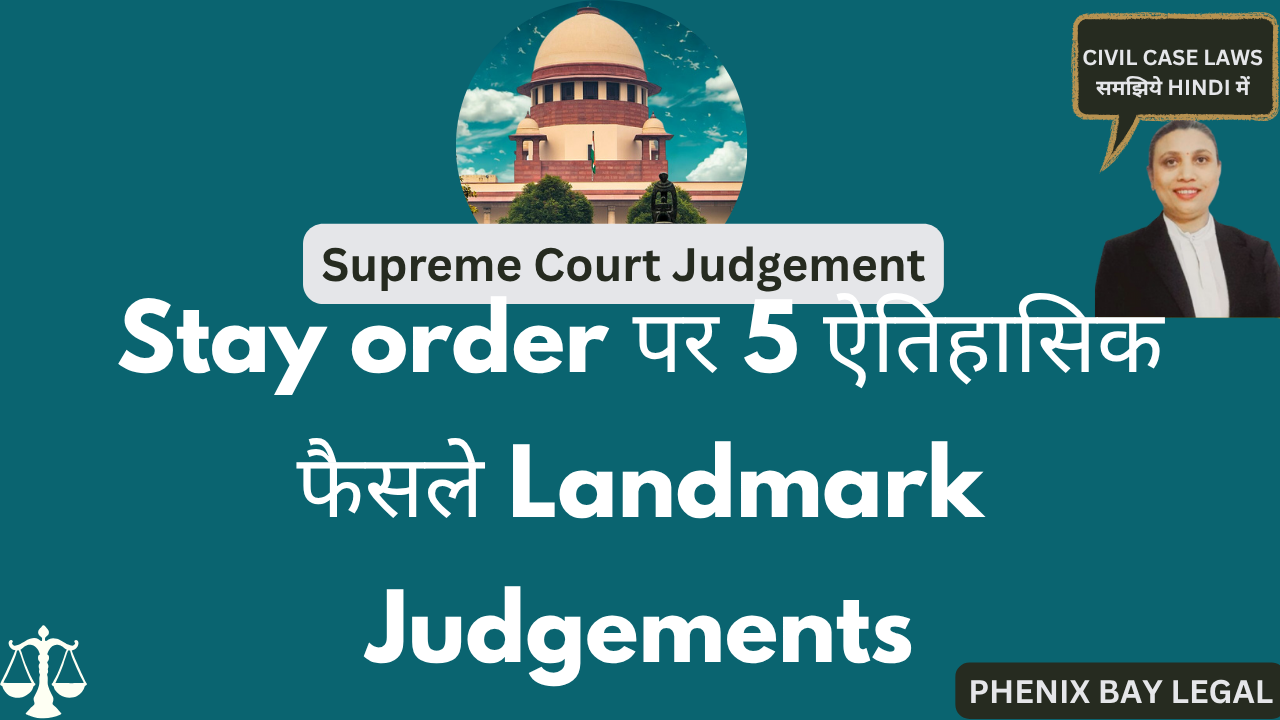
The Legalities of Property Transactions Under RERA: A Homebuyer’s Guide
Discover key insights into the RERA Act, your rights as a homebuyer, and important legal considerations for property transactions in this in-depth guide.
The Legalities of Property Transactions Under the Real Estate (Regulation and Development) Act (RERA): Insights and Key Considerations for Homebuyers
The real estate sector has long been a significant contributor to India’s economy, offering opportunities for homeownership, investment, and commercial growth. However, it has also been plagued with issues such as project delays, lack of transparency, misrepresentation of project features, and unfair practices by developers. In response to these challenges, the Government of India introduced the Real Estate (Regulation and Development) Act (RERA) in 2016 to protect homebuyers and enhance transparency in the sector.For both homebuyers and developers, understanding the legal framework provided by RERA is essential for navigating property transactions. In this in-depth article, we will examine the key provisions of RERA, the rights of homebuyers, and the critical points to consider during real estate transactions.
- What Is RERA and Why Was It Enacted?
Before RERA was enacted, the Indian real estate sector was largely unregulated, resulting in several problems for homebuyers, including delays in project completion, lack of accountability by developers, and misleading information about projects. RERA was enacted with the primary objective of:
- Regulating the real estate sector.
- Bringing transparency and accountability to the process.
- Protecting the interests of homebuyers.
- Ensuring timely delivery of real estate projects.
- Establishing an efficient grievance redressal system.
Under RERA, each state and union territory is required to establish its own Real Estate Regulatory Authority to oversee the implementation of the Act and resolve disputes between buyers and developers.
- Key Provisions of RERA: Protecting Homebuyers
RERA establishes several provisions that are designed to safeguard the rights of homebuyers and ensure that real estate transactions are fair, transparent, and legally compliant. Let’s take a closer look at these provisions:
- a) Mandatory Registration of Projects
One of the most significant changes introduced by RERA is the requirement for developers to register their projects with the state’s Real Estate Regulatory Authority. This includes all residential and commercial projects that are over 500 square meters in size or have more than eight apartments. Without this registration, developers cannot advertise, sell, or market their properties.
Developers must provide all necessary project details during registration, including:
- Project layout and plans.
- Timelines for completion.
- Status of approvals and clearances.
- Financial details of the project.
This ensures transparency and allows homebuyers to verify project information before making any investment decisions.
- b) Transparency in Advertisements
Before RERA, developers often used marketing gimmicks or false advertising to lure potential buyers. Under RERA, developers are required to provide accurate project details in all advertisements and marketing materials. Misleading advertisements can lead to penalties and even the cancellation of the developer’s registration.
- c) Carpet Area Definition
One of the most critical reforms under RERA is the standardized definition of "carpet area." Prior to RERA, developers often misled buyers by advertising larger "super built-up" areas, which included common spaces like lobbies and staircases. RERA mandates that all agreements and advertisements must clearly state the carpet area (the area within the walls of an apartment) to ensure transparency.
- d) Obligation to Complete Projects on Time
Project delays were one of the most common complaints from homebuyers before RERA was enacted. To address this, RERA imposes strict deadlines for project completion. Developers are required to provide a realistic timeline during project registration, and any delay beyond this timeline could result in penalties. Additionally, buyers are entitled to compensation in case of delays.
- e) Interest on Delayed Possession
If the developer fails to deliver the project within the promised timeline, RERA entitles homebuyers to receive interest on the delayed possession. The interest rate is generally equivalent to the EMI (Equated Monthly Installment) that buyers are paying on their home loans, which helps mitigate financial burdens for buyers during the delay period.
- f) Provision for Advance Payment
Under RERA, developers cannot demand more than 10% of the property’s cost as an advance payment or booking fee before entering into a formal sales agreement with the buyer. This provision prevents developers from collecting large sums of money upfront without providing sufficient documentation or guarantees.
- g) Escrow Account for Developers
RERA mandates that developers must deposit 70% of the funds collected from homebuyers into a dedicated escrow account. This money can only be used for the construction and land-related expenses of the specific project, ensuring that developers do not divert funds to other projects, thereby reducing the risk of project delays.
- h) Right to Information
RERA gives homebuyers the right to access all project-related information, including approvals, plans, progress reports, and land title status. This provision ensures that homebuyers are well-informed and can make decisions based on accurate information.
- i) Grievance Redressal Mechanism
One of the most important aspects of RERA is the establishment of Real Estate Appellate Tribunals in each state, where homebuyers can file complaints against developers. These tribunals are required to resolve disputes within 60 days, ensuring swift justice.
- The Rights of Homebuyers Under RERA
RERA has empowered homebuyers in several ways by outlining their rights and ensuring developers are held accountable. Here are the key rights that homebuyers should be aware of when entering into property transactions:
- a) Right to Obtain Information
Homebuyers have the right to access detailed information about the project, including:
- Sanctioned plans and layout.
- Stage-wise progress of the project.
- Estimated completion time.
- Approvals and other permissions obtained by the developer.
This transparency helps buyers make informed decisions and reduces the risk of fraud.
- b) Right to Demand Project Timeline Adherence
If the developer fails to complete the project as per the promised timeline, the buyer has the right to withdraw from the project and seek a full refund along with interest. Alternatively, the buyer can continue with the project and claim compensation for the delay.
- c) Right to Possession
Upon the completion of the project, buyers are entitled to possession of the property and the common areas. RERA requires developers to complete the project within the stipulated timeline and hand over possession on the agreed date.
- d) Right to Compensation for Defects
If any structural or quality defects arise in the property within five years of possession, RERA mandates that the developer is responsible for rectifying the issues without any extra charge. This includes defects related to workmanship, quality of materials, or construction.
- e) Right to Cancel the Agreement
Homebuyers have the right to cancel the agreement if the developer fails to adhere to the project timeline or violates any provisions of the contract. In such cases, the buyer is entitled to a full refund along with interest.
- f) Right to File Complaints
If a homebuyer feels that the developer is violating any provisions of RERA, they have the right to file a complaint with the Real Estate Regulatory Authority or the Real Estate Appellate Tribunal. Buyers can seek relief and compensation through this mechanism.
- Key Considerations for Homebuyers in Real Estate Transactions
Navigating the real estate market can be a daunting task, especially for first-time buyers. With RERA in place, there are several important factors that homebuyers should consider to ensure a smooth and legally sound transaction:
- a) Verify Project Registration
Before making any investment, homebuyers should verify whether the project is registered under RERA. This can be done by visiting the official RERA website of the respective state, where buyers can access information about registered projects, developers, and project details.
- b) Check the Developer’s Credentials
Homebuyers should conduct due diligence on the developer’s reputation, track record, and financial stability. This includes reviewing past projects, checking for any complaints filed against the developer, and assessing whether the developer has adhered to timelines in previous projects.
- c) Understand the Terms of the Sale Agreement
The sale agreement is a legally binding document, so it’s essential for homebuyers to thoroughly review its terms and conditions. This includes understanding:
- The payment schedule.
- Project completion date.
- Penalties for delays.
- The scope of the developer’s obligations.
Ensure that the agreement complies with RERA and does not include any unfair clauses.
- d) Evaluate the Carpet Area
As RERA mandates that developers must disclose the carpet area, homebuyers should ensure they understand what they are paying for. Verify that the price being quoted is based on the actual usable area of the property, and not the super built-up area.
- e) Obtain Financial Approvals
Homebuyers should ensure they have secured the necessary financing for their property purchase, whether through a home loan or other means. Many banks and financial institutions now offer loans only for RERA-registered projects, which provides an additional layer of security for buyers.
- f) Monitor Project Progress
RERA requires developers to provide regular updates on the progress of the project. Homebuyers should monitor these updates to ensure that the project is moving according to schedule. If there are any discrepancies, buyers can take immediate action.
- g) Be Aware of Post-Possession Responsibilities
Once possession is handed over, homebuyers should be aware of their rights regarding maintenance, defects, and ownership transfer. It’s important to check the status of the Occupancy Certificate (OC) and ensure that all necessary paperwork is in place.
- h) File Complaints if Necessary
If homebuyers encounter any issues during the transaction or after possession, they should not hesitate to file a complaint with the relevant Real Estate Regulatory Authority. RERA’s grievance redressal system is designed to provide swift resolution and protect the rights of homebuyers.
- Challenges and Criticisms of RERA
While RERA has brought about significant improvements in the real estate sector, it is not without its challenges and criticisms. Some of the key concerns include:
- Incomplete Implementation in Some States: While most states have implemented RERA, some states have been slow in adopting all its provisions. This has resulted in varying levels of protection for homebuyers across the country.
- Small Projects Exemption: Projects below 500 square meters or fewer than eight units are exempt from RERA registration. This has allowed some developers to bypass the Act by dividing larger projects into smaller segments.
- Delay in Dispute Resolution: Although RERA aims to resolve disputes within 60 days, the actual time taken can be longer due to the backlog of cases in some states.
Despite these challenges, RERA remains a crucial step forward in protecting homebuyers and bringing much-needed regulation to the real estate sector.
Conclusion
The Real Estate (Regulation and Development) Act (RERA) has transformed the real estate landscape in India by establishing a robust legal framework to protect homebuyers, promote transparency, and hold developers accountable. Whether you’re a first-time homebuyer or a seasoned investor, understanding the key provisions of RERA is essential for making informed decisions and safeguarding your investment.As you navigate the complexities of real estate transactions, it’s important to stay vigilant, conduct thorough due diligence, and seek legal advice when necessary. At Phenix Bay Legal, our experienced legal team is here to guide you through every step of the process, ensuring that your rights are protected and your real estate transactions are legally sound.Need legal advice on your real estate transactions? Contact Phenix Bay Legal today to learn how we can assist you in navigating the complexities of property law.
Phenix Bay Legal also provides Crash Course on Drafting All in one civil criminal and contract Drafting course
For all type of Legal Formats and Drafting Support Drafting Subscription Plan
- #RERA
- #PropertyInvestment
- #FirstTimeHomeBuyer
- #RealEstateTips
- #PropertyLaws
- #HouseHunting
- #RealEstateAdvice
- #RealEstateLaw
- #PropertyDevelopers
- #PropertyMarket
- #RealEstateTransactions
- #RealEstateRegulation
- #RealEstateInvesting
- #HousingMarket
- #RealEstateAgents
- #PropertyDeals
- #RealEstateLawyers
- #PropertyLaw
- #RERAACT
- #LegalAdvice
- #LegalUpdates
- #LawyerLife
- #PropertyDisputes
- #ContractLaw
- #LegalInsight
- #LawBlog
- RERA Act 2016
- Real Estate Regulation
- Property Laws in India
- Homebuyer Rights
- Real Estate Legalities
- Real Estate Compliance
- RERA Registration
- Real Estate Developer Accountability
- Real Estate Disputes
- Legal Guide for Homebuyers
More >>

Jyoti Sharma vs. Vishnu Goyal & Anr. 2025 INSC 1099
This was a long running legal battle between a landlord and her tenants over a shop. The landlord, Jyoti Sharma, wanted her shop back for two main reasons: The tenants had stopped paying rent. She needed the shop to expand her family's business (her bonafide need).

Landmark Judgement on Injunction
In civil, commercial, or even family disputes. But when is a simple injunction suit enough? When do you need to add a declaration of title? And how do courts balance urgency vs evidence in interim relief?

Case Analysis: Stay Order Violation and Contempt of Court by Supreme Court of India
Giving an undertaking to the court is equivalent to an order of injunction—any violation invites contempt proceedings.Injunction orders remain valid until formally vacated by a court—violation before vacation can lead to punishment.

Order 7 Rule 11 of CPC Explanation in Land Mark Judgement
The Sopan Sukhdeo Sable judgment is a landmark ruling that reinforces Order 7 Rule 11 of CPC as a safeguard against frivolous and legally untenable claims. It highlights the importance of examining only the plaint’s contents to decide whether a suit should be dismissed at the threshold.

CPC Order- Order 14 to 20 Explanation IMPORTANT CASE LAWS +MCQ’S for Judiciary Exam Preparation
CPC Order- Order 14 to 20 Explanation IMPORTANT CASE LAWS +MCQ’S for Judiciary Exam Preparation

Supreme Court ImportanatJudgement - Landlord Tenant Bonafide need
This case involves a dispute over eviction of a tenant based on the bona fide need of the landlord. The Supreme Court ruled in favor of the landlord, reversing the High Court's decision. Below is a detailed breakdown of the judgment with relevant legal principles, precedents, and reasoning.